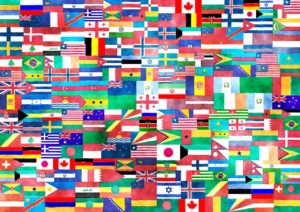Globalization
Globalization means integrating the economy of a country with the economies of other countries under conditions of free flow of trade and capital and movement of persons across borders.
IMF defines globalization as “The growing economic interdependence between countries through increasing volume and variety of cross-border transactions in goods and services and of international capital flows and also through the more widespread diffusion of technology”
Globalization has four parameters →
→Reduction of trade barriers – so as to promote free flow of goods and services.
→Creation of environment in which free flow of capital can take place
→Creation of environment permitting free flow of technology
→Creation of environment in which free movement of labor can take place
Features of Globalization →
→The business expands throughout the world
→Good/Services are bought/sold to/from any country in the world
→Difference between domestic and international markets comes to an end
→Products are planned and developed keeping in mind the markets of entire world
→Manufacturing and Distribution can be done at any part of the world based on feasibility and viability
→Outsourcing of goods and services can be done
Conditions for Globalization →
→Quotes and tariffs must be removed.
→Freedom must be given to business and industries.
→Bureaucratic hurdles should be removed.
→Rules and regulations of control should be liberalized.
→Money and capital markets should be developed.
→Suitable Globalization strategies must be adopted.
→Administrative and Govt. support is essential.
Process of Globalization →
Obame explained the five stages of globalization –
Stage I – Domestic company exports to foreign countries through dealer and distributions of home country.
Stage II – Domestic Company exports to foreign countries directly on its own.
Stage III – Domestic Company becomes an international company establishing production and marketing operations in various foreign countries.
Stage IV – The Company replicates a foreign company in the foreign country by having all the facilities R&D, HR etc.
Stage V – The Company becomes a true foreign company by serving the needs of foreign customers just like the host country’s company serves.
Types or Components of Globalization
(i) Globalization of Markets – Integration and merger of the different markets of the world into a single market. The common norms, tastes and preferences are identified enabling the cultural shift towards use of a common product or service.
Reasons – (a) Industrialization of economies
(b) Maximization of profits
(c) Shortage of product in home country
(d) Adverse selling environment
(e) Expansion of businesses
(ii) Globalization of Production – Location of manufacturing facilities favorable more in foreign countries than in home country leads companies to shift manufacturing in foreign country to produce goods of high quality at low cost.
Reasons – (a) Cheap raw materials
(b) Skilled and unskilled labor availability
(c) To avoid restrictions
(d) Reduce cost of transportation
(iii) Globalization of Technology – Technological advancement paves a way for a company to enter foreign markets.
Methods for Globalization of technology – (a) Joint ventures and mergers
(b) On the basis of Royalty or purchase of Technology
(c) Technology collaborations
(d) Latest technology
(iv) Globalization of Investment – It may also be termed as Foreign Direct Investment. Following GATT and WTO, many countries reduced on eliminated investment barriers. MNC’s study the feasibility study of projects overseas and invest capital.
Reasons – (a) Avoid restrictions of export by home country
(b) To have control over manufacturing and marketing activities
(c) Avoid restrictions of licensing
(d)The rate of interests and rate of returns are high in developing countries
Advantages of Globalization
◊ Helps in free flow of capital from one country to another
◊ Helps in free flow of technology from developed to developing countries
◊ Helps in booting industrialization and balanced growth of world economies
◊ Improves standard of living of people
◊ Makes available high quality goods at low prices
◊ Helps in spreading production facilities
◊ Increases employment opportunities and decreases cultural differences
Disadvantages of Globalization
◊ Vanishes the domestic businesses
◊ Causes decline in demand of domestic products
◊ Leads to commercial and political colonialism
◊ Widens the gap between rich and poor
◊ Developed countries exploit the resources of developing countries
◊ Threat national sovereignty as the economic power shifts from the independent industries to the international organization

i want these notes